Politics
Meet Lahar Singh Siroya — The Eternal 'Outsider' Who Can’t Be Ignored In Karnataka's Politics
Sharan Setty
Jan 30, 2025, 02:22 PM | Updated 03:19 PM IST
Save & read from anywhere!
Bookmark stories for easy access on any device or the Swarajya app.
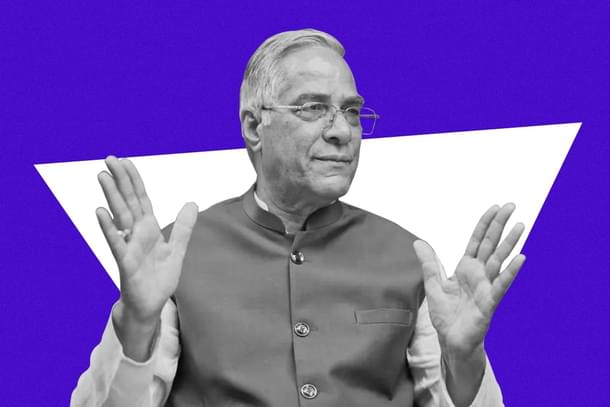
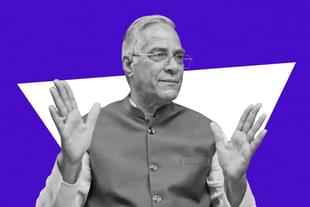
Lahar Singh Siroya is a senior leader in the Bharatiya Janata Party (BJP) and a Member of Parliament (MP) in Rajya Sabha, elected from Karnataka in July 2022.
A video of him taking his oath in Kannada went viral on social media, with Kannadigas appreciating his effort to speak the local language despite hailing from a different state.
Though he is always away from the limelight, he has carved a rare niche for himself in the party and in public life.
He never hesitates to voice his views or ask tough questions—sometimes even at the cost of embarrassing a few party leaders—but remains committed to doing what he believes is right, even when it offers no political dividends.
He has been a loyal member of the party for more than five decades and has often been described as the state BJP unit’s Hindi conduit to the central leadership.
Early Days
Lahar Singh Siroya, a Rajya Sabha MP from Karnataka, is not the archetypal career politician. Born in Udaipur, Rajasthan, in the heart of Mewar — a region steeped in the history of Maharana Pratap's resistance — Siroya's early years were shaped by stories of struggle and resilience. Sitting in his RMV Extension office, not too far from the Indian Institute of Science, he recalls his early days.
“Nationalism is in our blood because we have suffered a lot,” he often says, tying his sense of identity to his roots.
In 1969, at the age of 22, Siroya arrived in Bengaluru with little more than an entrepreneurial spirit. The city, then just beginning its transformation into a hub of opportunity, became his new home.
An outsider unfamiliar with the local language, culture, or even fluent Hindi, he spent decades carving a space for himself — not just in business but also in Karnataka’s political circles.
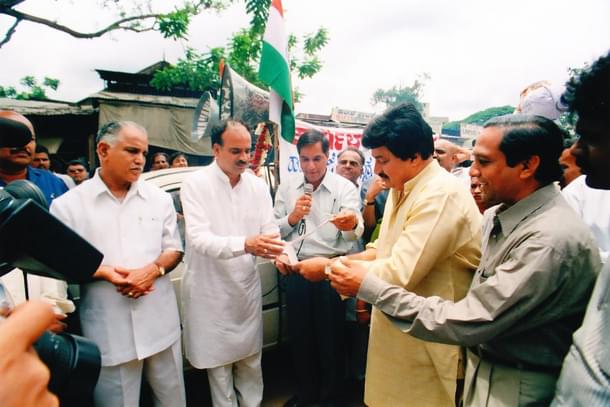
Bridging Ideologies and Geographies
Siroya’s association with the Jan Sangh, the precursor to the Bharatiya Janata Party (BJP), began early in his life. Drawn to its Hindutva ideology, he remained actively involved through its transition into the BJP.
“I wasn’t highly educated or from a wealthy family. Politics and business had to be managed side by side,” he recalls. His early years were defined by grassroots organising, often working with limited resources.
By his own admission, the 1980s were particularly challenging. The BJP was far from the dominant political force it is today. “In 1984, all seats were lost except two. It was a time of introspection,” he notes. For much of this period, Siroya stayed in the background, building connections and ensuring the party’s survival in Karnataka.
His non-electoral career allowed him to focus on party organization rather than the pressures of campaigning. Serving two terms as an MLC, he prioritized issues over personal ambition. “I’ve always thought about what the party and its leaders could gain, not what I could take from them,” he says.
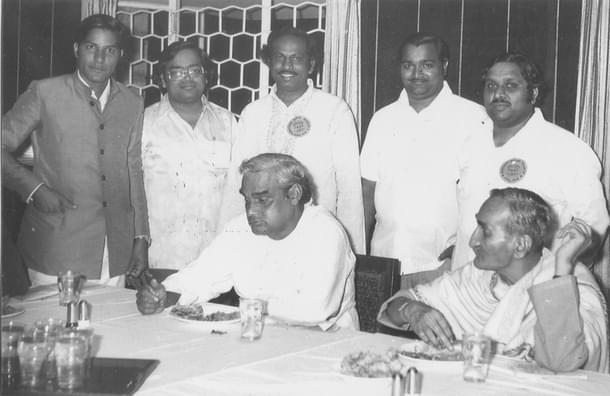
Navigating Karnataka’s Complexities
Siroya’s journey in Karnataka mirrors the broader challenge of integrating into a state with a strong linguistic and cultural identity. He believes the language debate is over-politicized.
“When I arrived, people spoke to me in Hindi, and I consciously made an effort to learn Kannada. No one forced me—it was mutual respect,” he explains.
This approach, he believes, helped him navigate the complexities of Karnataka’s politics. Unlike some leaders who thrive on polarization, Siroya prioritizes common ground. “The average Kannadiga doesn’t resent those who speak different languages. That divide is artificially created,” he argues.
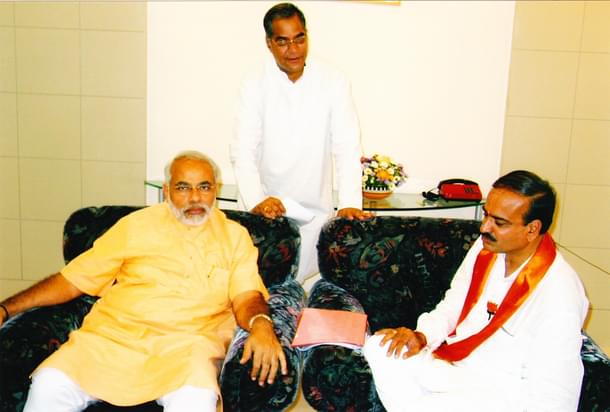
Observing Modi and the Changing BJP
Having spent over 50 years with the party, Siroya has witnessed its transformation from a fringe outfit to a national powerhouse. He recalls his early interactions with Narendra Modi, long before he became Gujarat’s Chief Minister.
“He was always a no-nonsense person, avoiding small talk and focusing on the bigger picture,” says Siroya, who sees Modi’s rise as a lesson in persistence and discipline. “He didn’t hold positions of power early on but always carried a sense of purpose.”
However, Siroya is not uncritical of the BJP’s growth. He acknowledges that expansion has led to ideological dilution. “When a party grows, all sorts of people join — some for power, some for money, some self-centred. It’s inevitable in a democracy,” he says, stressing the need to protect the party’s foundational principles from opportunism.
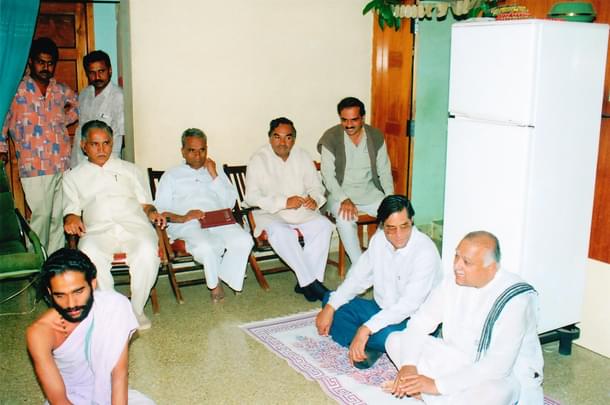
Local Issues and National Priorities
While his political work involves national-level strategising, Siroya remains deeply engaged with local issues in Bengaluru. From rising narcotics use among youth to the city’s infamous traffic woes, he has consistently spoken out on matters affecting daily life.
“Narcotics is a serious issue, and I’ve been trying my bit to fight it. Traffic, too, needs immediate attention. These are problems that affect everyone, regardless of politics,” he says.
Siroya’s approach is pragmatic. He acknowledges politics has its limitations but believes in persistent effort. “We didn’t have cars back then. Leaders like Anant Kumar, B.S. Yediyurappa, and I traveled on scooters and buses. The challenges differed, but the focus was the same—solving problems.”
As early as November 2022, he emphasised the need for a smooth generational transition in Karnataka’s BJP unit. Advocating the Gujarat model of candidate selection, he sent tremors through the state unit, suggesting that Karnataka should follow Gujarat’s example, where leaders like former CM Vijay Rupani and ex-DyCM Nitin Patel stepped aside to make way for new faces.
Though Siroya holds no formal organisational role, he is still considered well-ensconced in the inner circle influencing key party decisions in Karnataka.
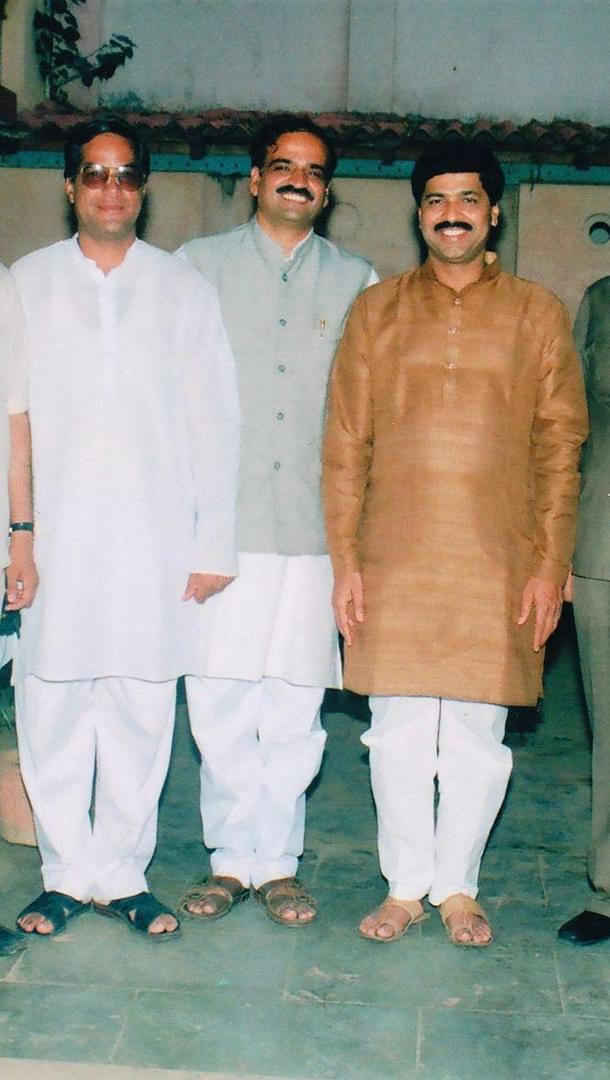
Actively Taking on Political Giants
In recent years, Siroya has made waves by taking on some of the most powerful figures in Karnataka politics. He has consistently raised concerns about misuse of power and nepotism, particularly targeting the Kharge family.
In August 2024, he questioned the Karnataka Congress government’s decision to allot land in the Hardware Sector of the Hi-Tech Defence and Aerospace Park in Bagalur to the Siddhartha Vihar Trust, led by Rahul Kharge. Calling it a blatant conflict of interest, he slammed the move as an abuse of power. The controversy escalated, leading to the Kharge family returning the five-acre plot amid an ongoing probe into the Mysuru Urban Development Authority site scam.
Similarly, Siroya raised questions about 19 acres of government land allotted free of cost to the International Institute of Pali, Sanskrit, and Comparative Philosophy in Gulbarga, run by the same trust. Backed by an audit report from 2017, he argued that such allocations were not in the larger public interest. These interventions, amplified by his social media posts, have garnered significant public attention, cementing his reputation as an outspoken critic of political favouritism.
Raising Relevant Issues in Parliament
Siroya’s parliamentary interventions have also gained attention. In August 2024, he stressed the need for stringent verification procedures in the selection of civil servants, citing allegations of misuse in OBC and disability quotas.
“The government must establish a foolproof system to hold corrupt practices accountable,” he said.
He has also advocated for utilising the expertise of retired IAS officers to generate revenue ideas for Karnataka instead of relying on multinational consultancies, a suggestion made during the ‘Invest Karnataka 2025’ initiative.
Another area where Siroya has made his mark is tourism. In December 2023, he urged the government to develop infrastructure to boost India’s destination wedding economy, taking forward Prime Minister Narendra Modi’s vision. His call for action led to Union Culture & Tourism Minister Gajendra Singh Shekhawat announcing initiatives like the ‘Wed in India’ Expo.
Beyond Politics
As a member of the Jain community, Siroya often reflects on his position as a minority. “We are a small community compared to others, but that doesn’t mean we should isolate ourselves. Unity is what makes this country strong,” he says.
His inclusive nationalism extends to acknowledging the contributions of all communities. “Maharana Pratap’s general was an Afghan Muslim. History is full of examples of collaboration,” he says.
Looking ahead, Siroya remains committed to the BJP’s vision but hopes for introspection and course correction where needed.
“Parivarvaad (dynastic politics) must end. It’s not wrong for someone from a big family to enter politics, but that shouldn’t be the only qualification,” he asserts.
For now, he continues to balance his roles as a businessman, politician, and bridge-builder. His journey, marked by quiet perseverance, reflects the complexities of navigating two worlds — one rooted in tradition and the other in Karnataka’s evolving political landscape.
Sharan Setty (Sharan K A) is an Associate Editor at Swarajya. He tweets at @sharansetty2.





